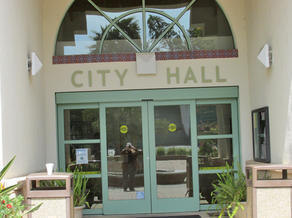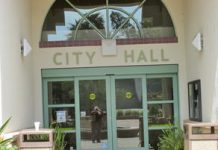Permit process allows amplified outdoor music
The City Council this week voted unanimously to replace Avalon’s noise ordinance with a new one. The new ordinance applies to outdoor music.
City Manager David Maistros told the council that from the information he has, the concerts are not the problem.
According to Maistros, the noise ordinance applies to outdoor music rather than indoor music.
He said businesses can have acoustic music (not amplified music) that would not be affected by the proposed ordinance.
No amplified music would be allowed after 8 p.m. in District 1, described in a staff report as mostly residential land with other uses in the area.
Mayor Anni Marshall said that the ordinance was a knee-jerk reaction to a couple of places that have abused the things, so the city is making other people go through “all these hoops.” She didn’t know how the city would enforce it.
The Avalon Sheriff’s Station will work with the city manager to enforce the code.
Councilmember Michael Ponce thought the proposal was very fair. He said at least the city had modernized the ordinance.
Councilmember Mary Schickling asked if a business would need to get a permit for each band.
Maistros said as long as the band was in the same location, they would have to comply with the times and number of performance times per week. “We would try to get something that would cover a period of time, whether it’s weeks or months,” he said.
Referring to a four-times-a-week restriction in the proposed ordinance, Shickling said it wasn’t fair to not let businesses have music seven days a week.
However, Shickling later expressed support for the ordinance overall.
Councilmember Lisa Lavelle said: “We’ve talked about this before and talked about limiting certain nights or to certain things.”
Lavelle also said she agreed that a lot of indoor locations have amplified music with open doors or windows. She suggested the council look at that issue.
Background
“The volume and frequency of noise caused by amplified music at commercial establishments as well as amplified music from residential areas has been the cause of recent and significant public complaints,” according to the staff report by City Manager David Maistros and Administrative Analyst Devin Hart.
“The California Constitution allows the City to enact an ordinance regulating excessive noise. The City’s current noise ordinance was established in June 1970 by Ordinance No. 531. The ordinance was amended in its entirety in January 1977 by Ordinance No. 623. Since that time, with the exception of select sections, the ordinance has remained unchanged,” according to the Maistros-Hart report.
Their report said that the proposed ordinance created four districts for measuring noise.
“Per the revised ordinance, amplified music after 8 p.m. is allowed by permit only and is only available in Districts 2, 3 and the Waterside/Harbor District. The permit process identifies a responsible party, and requires the submission of a Sound Impact Plan,” according to the Maistros-Hart report.
“The Sound Impact Plan will include site plan that illustrates the location of any stage, size, location and orientation of speakers or other sound amplifying devices and indication of any sound buffering measures being taken,” according to the Maistros-Hart report.
“The plan must identify a location for sound readings no more than 50 feet from the source of amplification. The applicant is required to keep a decibel meter on site and self-monitor the volume of sound at that location throughout the event. The volume of the sound may not exceed 70 decibels at the location of the designated sound measurement location,” according to the Maistros-Hart report.
“Per the ordinance, the first violation of the noise ordinance will constitute an infraction. The person in violation, as well as the responsible party, shall be issued a notice of violation. Continuing or subsequent violations within a 12 month period shall result in a misdemeanor resulting in a $500 fine for the second violation, $1000 fine for the third violation, and revocation or suspension of Transient Rental License or Special Use Permit for a period of 6 months, if applicable, and/or an additional $1 ,000 fine per violation issued to the property’s responsible party,” according to the Maistros-Hart report.











